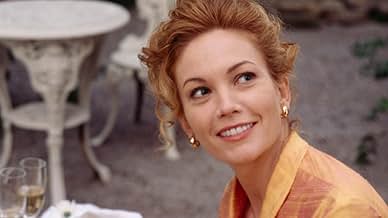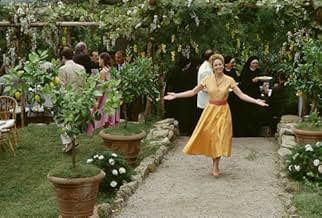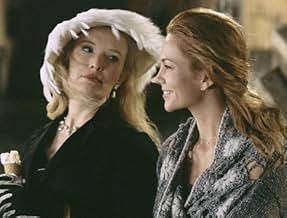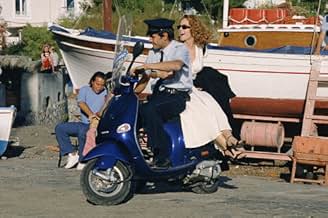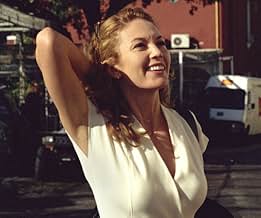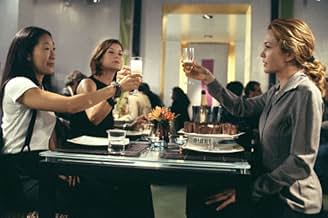Una scrittrice acquista d'impulso una villa in Toscana per cambiare la propria vita.Una scrittrice acquista d'impulso una villa in Toscana per cambiare la propria vita.Una scrittrice acquista d'impulso una villa in Toscana per cambiare la propria vita.
- Premi
- 5 candidature totali
Giulia Louise Steigerwalt
- Chiara
- (as Giulia Steigerwalt)
Recensioni in evidenza
It's a story about how people who want things badly rush themselves into experiences that are worse than their previous ones. It's a good movie with several deep messages. The movie also has a certain atmosphere that makes you feel as if you are in Tuscan on a trip yourself. I have to disagree with the view that says you need to be in love to enjoy the movie. All what you need is some depth and you will definitely relate to the protagonist. She happens to be healing from a failing marriage but you can relate to her story if you are dealing with any kind of problems in your life.
There is one specific part of the movie which I truly like is the one where she defends the love story of a young couple though she was hurt. This shows that even though she failed she didn't cease to believe in love. She succeeded in going out of the egocentricity of a person who usually hates good for people if his life is not working successfully.
There is one specific part of the movie which I truly like is the one where she defends the love story of a young couple though she was hurt. This shows that even though she failed she didn't cease to believe in love. She succeeded in going out of the egocentricity of a person who usually hates good for people if his life is not working successfully.
Romance . It is the first conclusion and it is far to be wrong. But... . It is more. Because it is a sweet exploration of the second chance. Because...Tuscany, the real lead character. Because...lovely performances and the taste of coffee with few cinnamon flavor. And because, in many scenes, it could be your dream in facts. And, sure, because Diane Lane. So, just lovely.
OK, first of all a heads up... I'm a British man of 56, having just watched this on the TV on a lazy Sunday afternoon, when I could of been catching up with Glastonbury or the football (Euro 2016). Not, I guess, the target audience.
Well, as I sat there on the sofa with my cuppa, enjoying the scenery, and this striking lady who I hadn't seen before, (trust me, I know Diane now, and have a list of her films to watch), I just became entranced.
I know I'm being manipulated, the mass of stereotypes, the fact (unlike most of us) she can just cash buy a villa on a whim, BUT, I gave in and went for the ride, and it couldn't of been better. I didn't want it to end, the feel good, the decent people, the Tuscan sun! Add in fellow Brit Lindsay Duncan's great performance, the ensemble cast, and you have a joy to watch which surely will make anyone feel better.
Well, as I sat there on the sofa with my cuppa, enjoying the scenery, and this striking lady who I hadn't seen before, (trust me, I know Diane now, and have a list of her films to watch), I just became entranced.
I know I'm being manipulated, the mass of stereotypes, the fact (unlike most of us) she can just cash buy a villa on a whim, BUT, I gave in and went for the ride, and it couldn't of been better. I didn't want it to end, the feel good, the decent people, the Tuscan sun! Add in fellow Brit Lindsay Duncan's great performance, the ensemble cast, and you have a joy to watch which surely will make anyone feel better.
"Under the Tuscan Sun" is a polarizing film that seems to leave viewers (and critics) either in love with a story of growth and renewal or dismissive of its line. I'm firmly in the former camp.
Based so loosely on Frances Mayes's own account of her regeneration in beautiful Italy as to carry an end credit pronouncing that substantial fictionalization replaced key true details, writer and director Audrey Wells crafted a stunning vehicle for Diane Lane whose radiance projects from the screen powerfully. And in every scene.
Diane Lane, as the changed-from-the-memoir Frances, abandons San Francisco after her never shown cad husband divorces her, getting the house she once loved. Frances is a writer and literary critic. Why does she leave S.F.? Two of her closest friends give her a ticket for a gay bus tour of Italy and she jumps off the bus to look into a ramshackle old country house up for sale. Impetuosity? Definitely. Believable? Yes, actually.
Frances' new house isn't a handyman's special, it's a contractor's assurance of food on the table for a very long time. Frances adapts to the house and the locals with remarkable aplomb. Tuscany is sunny but its light fades before Frances's challenged but resilient commitment to not just restore a house but to create a home. The two aren't the same. I'm not sure how many male directors could so well create that reality.
Director Wells tells the story from a woman's heart but with a breadth of humor and drama that should appeal to anyone who wants to believe, or needs to hope, that there really is a light at the end of the tunnel of marital infidelity and dissolution.
Supporting Diane Lane is Sandra Oh as Patti, her closest friend. In relatively short scenes, Ms. Oh displays a lively and laconic grasp not only of her friend's life but also of her own which is not, as they say today, devoid of "issues."
Lindsay Duncan is Katharine, an older woman determined to hold on to her now fading attractiveness through a blend of humor, earthiness - and alcohol. Her character may be predictable but she's also fun.
Raoul Bova has garnered some press attention as handsome Marcello, the romantically available and affluent Italian. That's a character we've seen in many, many films and Bova delivers an expectedly satisfactory but hardly deep performance.
Yes, Diane Lane is beautiful but there is much more to her acting than a shining appearance. Her facial gestures, mirroring her emotions as they shift from moment to moment, are the product of extraordinary acting ability. And her character draws a powerful portrayal.
Credit also must go to cinematographer Geoffrey Simpson. Perhaps it would be impossible for a blind camera director to turn in anything but a gorgeous visage of rural and urban Italy but Simpson did do a marvelous job of making the locales come alive.
This is a film for adults, for people who can understand pain and the search for recovery and understand the difficulty of coming back from a space that once offered the mirage of safety and security.
I loved this film.
9/10.
Based so loosely on Frances Mayes's own account of her regeneration in beautiful Italy as to carry an end credit pronouncing that substantial fictionalization replaced key true details, writer and director Audrey Wells crafted a stunning vehicle for Diane Lane whose radiance projects from the screen powerfully. And in every scene.
Diane Lane, as the changed-from-the-memoir Frances, abandons San Francisco after her never shown cad husband divorces her, getting the house she once loved. Frances is a writer and literary critic. Why does she leave S.F.? Two of her closest friends give her a ticket for a gay bus tour of Italy and she jumps off the bus to look into a ramshackle old country house up for sale. Impetuosity? Definitely. Believable? Yes, actually.
Frances' new house isn't a handyman's special, it's a contractor's assurance of food on the table for a very long time. Frances adapts to the house and the locals with remarkable aplomb. Tuscany is sunny but its light fades before Frances's challenged but resilient commitment to not just restore a house but to create a home. The two aren't the same. I'm not sure how many male directors could so well create that reality.
Director Wells tells the story from a woman's heart but with a breadth of humor and drama that should appeal to anyone who wants to believe, or needs to hope, that there really is a light at the end of the tunnel of marital infidelity and dissolution.
Supporting Diane Lane is Sandra Oh as Patti, her closest friend. In relatively short scenes, Ms. Oh displays a lively and laconic grasp not only of her friend's life but also of her own which is not, as they say today, devoid of "issues."
Lindsay Duncan is Katharine, an older woman determined to hold on to her now fading attractiveness through a blend of humor, earthiness - and alcohol. Her character may be predictable but she's also fun.
Raoul Bova has garnered some press attention as handsome Marcello, the romantically available and affluent Italian. That's a character we've seen in many, many films and Bova delivers an expectedly satisfactory but hardly deep performance.
Yes, Diane Lane is beautiful but there is much more to her acting than a shining appearance. Her facial gestures, mirroring her emotions as they shift from moment to moment, are the product of extraordinary acting ability. And her character draws a powerful portrayal.
Credit also must go to cinematographer Geoffrey Simpson. Perhaps it would be impossible for a blind camera director to turn in anything but a gorgeous visage of rural and urban Italy but Simpson did do a marvelous job of making the locales come alive.
This is a film for adults, for people who can understand pain and the search for recovery and understand the difficulty of coming back from a space that once offered the mirage of safety and security.
I loved this film.
9/10.
Diane Lane has always fascinated me, ever since I saw her debut movie, "A Little Romance," as a pre-teen. (She was in her early teens.) She has an elusive quality. She can look like a middle-aged, mom-next-door in one scene, and a girlish young woman in the next, seemingly without effort. Anyway, she is a consistently good actress, and, as Frances, is the one through whose eyes we see the story of "Under the Tuscan Sun." This is a delightful little movie, featuring lots of beautiful scenery, and containing some valuable messages: that love creates a family, and that oftentimes, our dreams come true in ways we would not have imagined. Sometimes, we have only to open our eyes to see the answers to our wishes right in front of us.
Lo sapevi?
- QuizThe elderly owner of Bramasole, grateful for a sign that Frances is the "right" buyer, cries out, "Grazie, Santo Francesco!" when a bird defecates on Frances' head. "Santo Francesco" is Saint Francis, the patron saint of animals.
- BlooperLindsay Duncan's English character shares her philosophy on "ladybugs" to Frances, but in Britain they are known as ladybirds.
- ConnessioniFeatured in Late Night with Conan O'Brien: Diane Lane/Wanda Sykes/Jonny Lang (2003)
- Colonne sonoreSaturday Night (Is the Loneliest Night in the Week)
Written by Sammy Cahn and Jule Styne
Performed by The Oscar Peterson Trio
Courtesy of The Verve Music Group
Under license from Universal Music Enterprises
I più visti
Accedi per valutare e creare un elenco di titoli salvati per ottenere consigli personalizzati
Everything New on Hulu in August
Everything New on Hulu in August
There's a whole lot to love about Hulu's streaming offerings this month — get excited for brand-new series premieres and film favorites to watch at home.
Dettagli
- Data di uscita
- Paesi di origine
- Lingue
- Celebre anche come
- Bajo el sol de Toscana
- Luoghi delle riprese
- Aziende produttrici
- Vedi altri crediti dell’azienda su IMDbPro
Botteghino
- Budget
- 18.000.000 USD (previsto)
- Lordo Stati Uniti e Canada
- 43.610.723 USD
- Fine settimana di apertura Stati Uniti e Canada
- 9.751.425 USD
- 28 set 2003
- Lordo in tutto il mondo
- 58.878.723 USD
- Tempo di esecuzione
- 1h 53min(113 min)
- Colore
- Mix di suoni
- Proporzioni
- 1.85 : 1
Contribuisci a questa pagina
Suggerisci una modifica o aggiungi i contenuti mancanti



